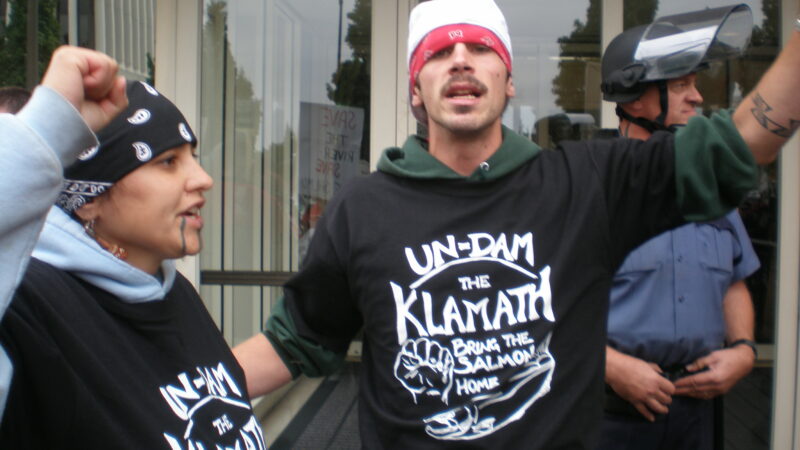
Karuk believe all things are connected. Humans are not separate from the natural world. Likewise, environmental and social justice are one in the same. Our health is more than a reflection of the natural world’s health, it is the same thing. When we have a river that’s sick from mining, dams, diversions and pollution, humans too will be sick. When our forests suffer from years of indigenous exclusion and fire suppression, it is no wonder why my people have social ills related to poor diet, substance abuse and depression.
This concept of interconnectedness paired with my sense of responsibility guides my life choices.
I recently left a staff position with the Karuk Tribe to focus on culturally responsive support for local elementary school students. Kids in my community already deal with intergenerational trauma every day of their lives. Now they must also deal with a pandemic and the consequences of two straight years of catastrophic wildfire in our community. I feel a deep sense of community responsibility to help these kids navigate this reality, just as our ancestors navigated similar struggles.
For the past 20 years, I have played a leadership role in the campaign to un-dam the Klamath River, which is on track to be the largest dam removal in U.S. history. During the campaign I met my wife, went head-to-head with Warren Buffett at his own shareholders meeting, and collaborated with traditional adversaries. Together we led marches, protests, and sometimes engaged in acts of civil disobedience. In the end, we had to sit down with political opponents to craft agreements that provide a sustainable future for the whole Klamath basin. While risking arrest to protect my birthright was at times scary, the hardest part was explaining to my community the need to compromise to reach an agreement with former adversaries.
During the pandemic, I built a Karuk home using traditional methods with kids in the community to pass on this ancient knowledge to the next generation. It is currently the only traditional structure in my Karuk homeland that is not for ceremonial use. This means anyone can use the structure regardless of age, gender, or ceremonial role. Here, any Karuk man, women or child can be transported in time together, and be the same Indians as our ancestors. We often feel as though our ancestors were these other people before contact, we feel separate from them. When we realize we are those same people, it is a revelation — a revelation that can spark the revitalization of traditional practices.
All natural things are connected and valuable, our efforts are the same. I will do ceremonial prayers, I will do science, I will do media, I will do direct action protest and advocacy, and occasionally I will do politics because I believe you cannot have success unless you include all of these pieces. In all my work, I am mindful to never do things that would embarrass my elders. This mindset has served me well. In my work at the school I have been called “school dad” because I go class to class ready to respond to a child in need. I often simply go into the schoolyard and play catch, listen or provide advice. I teach kids the medicinal uses of native plants, cultural art and, of course, environmental protection. I teach how to organize nonviolent direct action and develop curriculum for adults when campaigning. I hunt, gather, fish and store winter food for my family. I was taught to to gather without exhausting resources and without being greedy, and to share bounty with each other, whether that is food, medicine, knowledge, or basket materials.
The tribal ceremonies I am most intimately involved with are called Pikyavish, which literally means “little fixing.” I love this word as it pertains to humanity. In a way, all one person can do is a little fixing. The word is humble as we should be. I move in the world with this thought in action. Fixing things, renewing relationships with the world, with people and, most importantly, with myself.
We must be committed to self-renewal to maintain the intergenerational struggle for good. The immediate perils of rapid climate change are daunting and can easily bring a person to a hopeless state, which is why we have to fight and heal at the same time. We need to look at these issues holistically, and not partition them as “that’s environmental justice over there,” and “that is charitable giving over here.” These ideas and work are not separate in my mind or in my experience. I hope my story will inspire others to do what they can in the hopes of better tomorrow and the next millennia.
Chook-Chook Hillman is a finalist for the 2021 Pritzker Emerging Environmental Genius Award. Join us on November 18 when we’ll hear from the finalists and announce a winner.
